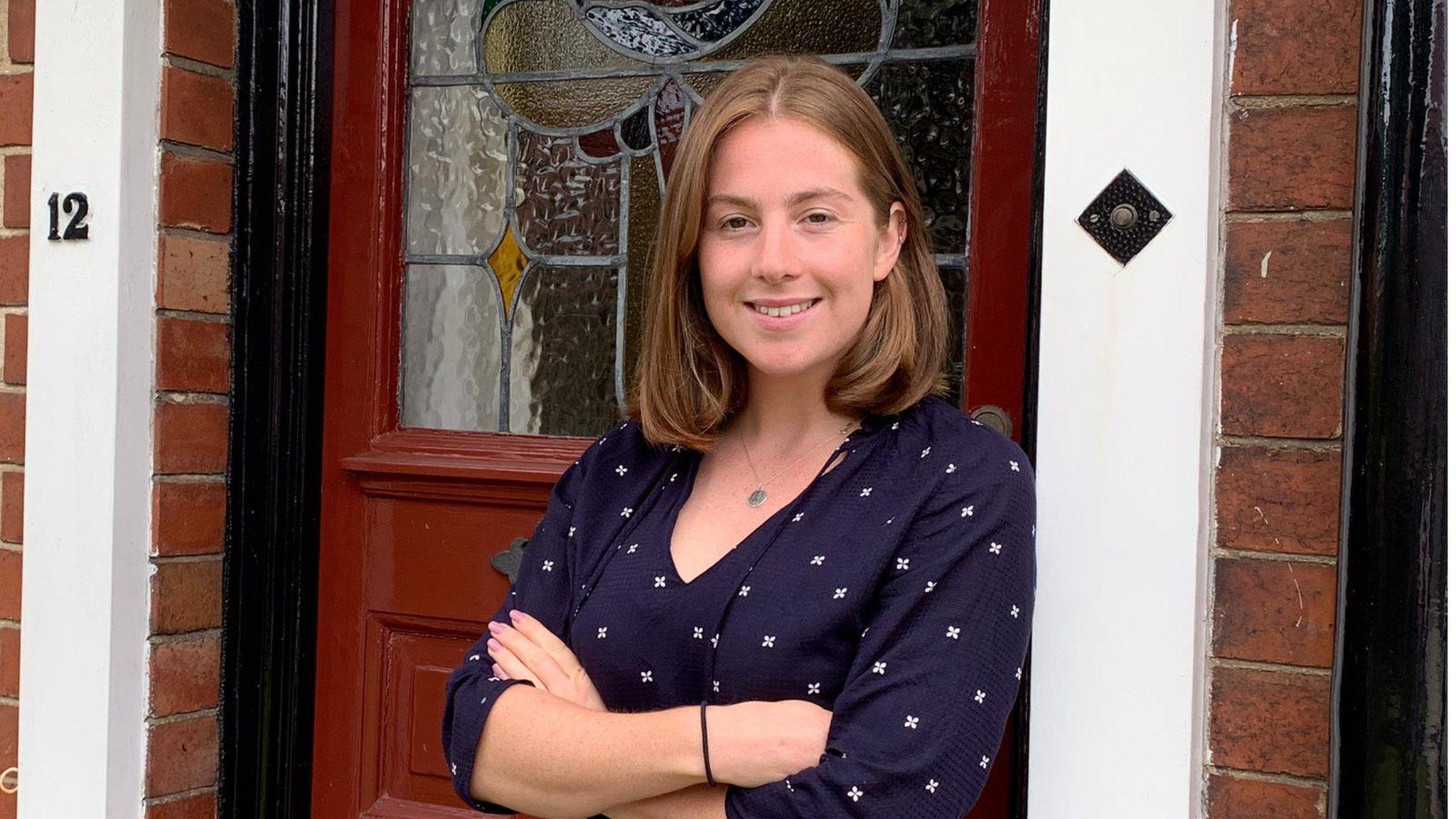Pensions: How much should I pay while I'm young?
- Published

If you have just left college or you're starting out in a new career, a pension might seem like one of the last things you have to sort.
I finally got round to paying into my work pension at 28.
I didn't know how much a month I should be putting in but people kept telling me about this simple magic formula.
Apparently you halve the age you are on the day you start paying in and that's the percentage of your wages you need to pay every month, until you retire.
So in my case, 14% of what I earn every month until retirement.
That's a workplace pension, and financial experts say small differences at the beginning of our careers can make a huge difference at the end.
Matt Wain from Manchester started paying into his pension when he was 20 and hopes his financial forward-planning will help him to retire at 55.
So how much should people save?
State pension v workplace pension
The state pension comes from the government and is based on your national insurance (NI) contributions, external.
The age you'd start getting a state pension age has just increased to 66 years old, and that will go up gradually over the next two decades.
You need to make ten full years worth of national insurance contributions to get some money from a state pension.
To get the full state amount, currently £175.20 a week, you will need 35 years worth of NI contributions.
Your workplace pension is what you pay through your employer, which they top up.
So in theory when you look at your wage slip, there are two pensions going on.
Use the government's calculator to find out your state pension age, external

Matt, a financial advisor, wanted to take his pension with him every time he moved job so he had more control over what goes in
Matt, 23, says he started paying into his workplace pension three years ago because he didn't want to miss out on the "free money" from the top-up.
He plans on upping his contributions every year.
"I like taking responsibility for my financial future," Matt tells Newsbeat.
"I've got my spreadsheets for how much I need [to retire] for when I'm 55."
He's gone a step further and moved his pension into a private account - something his employer has agreed to pay into - so when he changes jobs keeping track of his savings is easier.
What do his mates think of his attention to detail?
"It's important to do it young," he says.
Since 2018, employers have to put their staff into a pension scheme.
You can opt out if you like but, as well as the long-term benefits you'd get, you're unlikely to pay tax on the money you put in.
Sarah Coles is a personal finance expert at Hardgreaves Lansdown.
She tell us: "If your employer puts in the equivalent of 3% of your salary and you put in 5%, that's much better than nothing but by no means enough."
She thinks if you want a comfortable retirement you need to up the amount you put in.
How much should I pay in?
Sarah agrees that the magic formula I mentioned earlier is a strong starting point.
She knows that when you are starting out there are a lot of costs, and housing is often thought of as the main big ticket to be saving for.
"Try to stick to between 12% and 15% throughout most of your career" says Sarah.
"Even going up by 1 or 2% is going to make a major difference over the long run."

Sade Taiwo says it's really important to start investing in yourself and there's no better time to start than now
Sade Taiwo from Essex runs a money advice service for millennials called The Penny Pal.
She tells Newsbeat: "I started paying into my pension at the age of 22, so basically as soon as I could. "
"What many people don't understand is that if you opt out of a workplace pension you are literally missing out on free money."
Sade wishes people would look to the long term, especially with interest rates so low at the moment - meaning you don't get so much for keeping your cash in savings accounts.
"With our generation's average house deposit being £46k, I am really investing in my pension this early out of fear that I won't be able to afford retirement."
It's so far off - I want the money now
Is that holiday next summer top of your financial to-do list?
Sarah Coles says you need to think of pensions as "money for you".
She hopes this helps people balance access to money for a rainy day with money for your pension.
Sarah thinks people shouldn't rely on their state pension alone.
Anyone born after 1977 won't get their state pension till they are 68 and many reckon the age will be over 70 by 2035.
What happens when you move job?
It's thought people have an average of 11 jobs in their life.
So it's important to take your work pensions with you.
"When you leave, talk to your [old] employer about what's in there, and make sure there is nothing really valuable like tax-free cash", Sarah says.
"[Then you might] keep that where it is. Otherwise look at consolidating it.
"You might be able to move it to your current employers or to a personal pension where it is all in one place."


Follow Newsbeat on Instagram, external, Facebook, external, Twitter, external and YouTube, external.
Listen to Newsbeat live at 12:45 and 17:45 weekdays - or listen back here.
- Published1 October 2020

- Published5 August 2020

- Published1 July 2020
